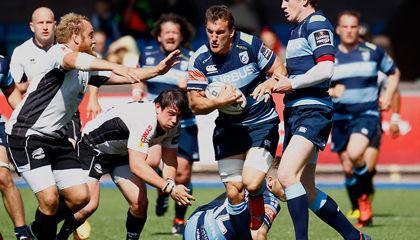Wales, already qualified as due reward for their courageous win at Twickenham, return there this Saturday to face Australia whose stunning 20-point victory margin against England means that, for the first time in World Cup history, the hosts have failed to negotiate the pool competition.
Saturday's decider will determine the next stage for both countries whose schedule raises the glowing prospect of their staying at Twickenham for the remainder of the tournament.
Wales, grateful for the longest pit-stop of the tournament and the chance to fix the engine of their scrum, are well aware that a win over one of the Southern Hemisphere big three is long overdue.
They got to the semi-final in Auckland four years ago without beating any of the trio despite losing their first match, unluckily, to South Africa in Wellington. Sam Warburton has wasted no time reminding his squad of the need to rectify a failure which, in a World Cup context, stretches back to the inaugural competition in 1987 and Paul Thorburn's touchline conversion of Adrian Hadley's try against the Wallabies in Rotorua.
More recently, Wales have been beaten ten times in a row by Australia, half of them by the excruciatingly narrow margin of one, two, two, again, three and four points.
Should they fail once more to end that losing streak, their quarter-final opponents will be South Africa, assuming they take all five points against the American Eagles at the Olympic Stadium in London this evening.
Assumptions at this Rugby World Cup are dangerous as the Springboks will readily testify given Japan's famous victory at their expense on the opening weekend. Scotland, their winning run punctured by the Springboks at St James' Park, stay on Tyneside for their make-or-break pool tie against a Samoan team roundly beaten by Japan.
Qualification for the Scots will give them a vested interest in the outcome of Australia-Wales later on Saturday afternoon. A fourth straight win for a Welsh team that never knows when it's beaten would secure an all-Six Nations tie and guarantee PRO12 representation in the last four.
Ireland's fate will be settled for better or worse back at their favourite home-from-home in Cardiff on Sunday against France. Having opened their campaign at the Millennium Stadium with 50 points against Canada, the Six Nations' champions return there for what was always going to be the decisive match.
The Six Nations rivals line up with almost identical records - each with 14 points out of a maximum 15. The winner will avoid the All Blacks in the last eight and plough headlong into Argentina, a daunting prospect in itself.
Since giving the holders a serious run for their money at Wembley, Los Pumas have produced some of the most exhilarating rugby of all. After running in seven tries from all angles against the engulfed Georgians at Gloucester, they ran in five more against Tonga at the weekend, each rapturously received by an ever-growing army of supporters which now includes the footballing superstar, Diego Maradona.
Ireland and Argentina have a bit of previous, most previously eight years ago at the Parc des Princes where the South Americans knocked them out before they could get as far as the knock-out stage. Beating France is imperative if Paul O'Connell, one of only two survivors with Eoin Reddan from the starting XV that day eight years ago, is to earn a shot at settling that particular score.
Europe's leading contender at 8-1, Ireland have owed France one in Rugby World Cup terms since King's Park in Durban in 1995 - so long ago that by then a hitherto unknown Kiwi had done his stint at Mullingar RFC and returned to New Zealand to further his career as a schoolteacher.
Joe Schmidt had no reason to make a point of remembering what happened in that quarter-final beside the Indian Ocean 20 years ago. France won 36-12 with nine goals from Thierry Lacroix and a try from Schmidt's opposite number on Sunday, Philippe Saint-Andre.
All Ireland managed that day were four penalties from Eric Elwood. Their line-up is worth recalling because that match was the last the Irish played before the IRB took the momentous decision in Paris two months later to declare rugby an open sport.
Ireland: Conor O'Shea; Darragh O'Mahony, Brendan Mullin, Jonathan Bell, Simon Geoghegan; Eric Elwood, Niall Hogan; Nick Popplewell, Terry Kingston, Gary Halpin; Gabriel Fulcher (replaced by Eddie Halvey), Neil Francis; David Corkery, Denis McBride, Paddy Johns.
Scotland's quarter-finals
1987 New Zealand at Lancaster Park, Christchurch. Lost 3-30.
1991 Western Samoa at Murrayfield. Won 28-6.
1995 New Zealand at Loftus Versfeld, Pretoria. Lost 30-48.
1999 New Zealand at Murrayfield. Lost 18-30.
2003 Australia in Brisbane. Lost 16-33.
2007 Argentina at Stade de France. Lost 13-19.
Ireland's quarter-finals
1987 Australia at Concord Oval, Sydney. Lost 15-33.
1991 Australia at Lansdowne Road. Lost 18-19.
1995 France at King's Park, Durban. Lost 12-36.
2003 France at Melbourne. Lost 21-43.
2011 Wales at Wellington. Lost 10-22.
Wales' quarter-finals
1987 England at Brisbane. Won 16-3.
1999 Australia at Millennium Stadium. Lost 9-24.
2003 England at Brisbane. Lost 17-28.
2011 Ireland at Wellington. Won 22-10.
Back on the domestic front, the Scarlets, Edinburgh and Munster made it three wins out of three during Round 3 of the Guinness PRO12 last weekend. When the competition returns on Friday October 16, the Scarlets and Edinburgh will be home in round four, against Leinster and Ulster respectively.
Munster are home, too, against Cardiff Blues on Saturday October 17 when two of the bottom three, Benetton Treviso and Ospreys, meet in Italy.
To buy tickets for the GUINNESS PRO12 Grand Final click here. Also follow us on Facebook, join the conversation on Twitter, sign up to our YouTube channel for extensive match highlights and sign up for our newsletter for regular updates on the GUINNESS PRO12.
-Guinness-PRO12---Leaderboard-Banner-2016_633x78.jpg)















